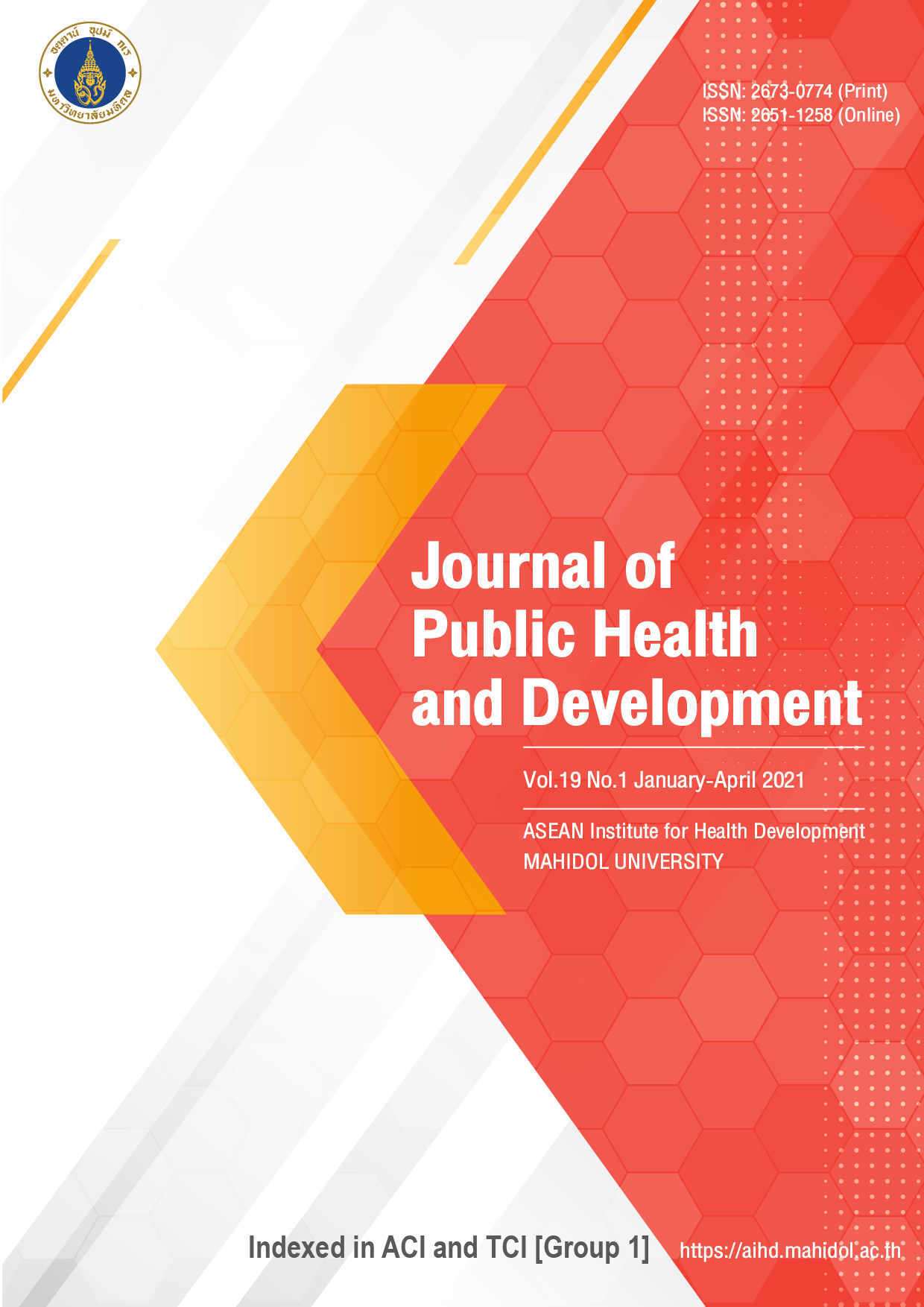Effect of top-level nursing management team characteristics and strategic implementation on nursing organization performance at community hospitals under the ministry of public health
Main Article Content
Abstract
This predictive research was to analyze the effects of top-level nursing management team (TNMT) characteristics and strategic implementation on nursing organization performance. The conceptual framework of this study was synthesized from Upper Echelon Theory by Hambrick & Mason (2007), the strategic implementation concept by Pearce & Robinson (2003) and the concept of organizational performance by the Baldrige Excellence Framework for Healthcare (2013). The samples were composed of 326 team members of TNMT in community hospitals under the Ministry of Public Health, Thailand. The research instruments comprised of 4 questionnaires including: 1) demographic data, 2) TNMT characteristics, 3) strategic implementation, and 4) nursing organization performance. The content validity indices of the questionnaires were 0.93, 1.00, and 0.91, respectively. Analysis of the structural validity of each questionnaire showed that each model was congruent with the empirical data (CMIN/DF = 1.51, 1.37, 1.07, RMR = .03, .02, .02, GFI =.97, .96, .94). The reliability of each questionnaire was 0.86, 0.89, and 0.93, respectively. Descriptive and inferential statistical methods were used for data analysis, which included frequency, mean, standard deviation, independent t- test and multiple regression analysis. The results revealed that TNMT characteristics, strategic implementation and nursing organization performance were at a high level ( = 3.80, SD= 0.46, = 3.73, SD=0.48 and = 3.64, SD= 0.44 respectively). TNMT characteristics and strategic implementation could predict nursing organization performance at 52.9% (R2 = .529). TNMT characteristics affected nursing organization performance with β =0.503 (p-value< .01), while strategic implementation affected nursing organization performance with β = 0.313 (p-value < .01). Therefore, the TNMT of nursing organizations should develop suitable team characteristics concerning demographic, psychographic and behavioral characteristics as well as strategy implementation, including operationalization and institutionalization strategies for achievement of nursing organizational performance of community hospitals.
Article Details
References
National Institute of Standards and Technology. The 2011-2012 Health care criteria for performance excellence [Internet]. [cited 2013 December 22]. Available from: http://www.nist.gov/ baldrige/publications/upload/2011-2012HealthCare Criteria.p
Nursing Division. Report of importance information of nursing from nursing information system [Internet]. [cited 2013 April 20]. Available from: http://www.nursing.go.th/Report/2015-02-06/report_datanurse57.pdf 2015
Nursing Organization. Report of nursing outcome indicators of commu-nity hospitals. 2017.
Díaz-Fernández MC, González-Rodríguez MR, Pawlak M. Top mana-gement demographic characteristics and company performance. IMDS. 2014;114(3):365-86.
Jahanshahi AA, Brem A. Sustainability in SMEs: Top management team behavioral integration as source of innovativeness. Sustainability. 2017; 9(10);1899.
Hambrick DC. Upper echelons theory: An update. AMR. 2007; 32(2):334-43.
Francis BJ. Top management team demographics, corporate strategy, organizational structure, and perfor-mance of Kenya state cooperation. [Thesis]. University of Nairobi; 2018.
Tulung JE, Ramdani D. The influence of top management team characteristics on BPD performance. IJRBS. 2016; 8(3):155-66.
Yoon W, Kim SJ, Song J. Top management team characteristics and organizational creativity. Rev Manag Sci. 2016; 10(4):757-79.
Hsu YT, Huang SPK. Top management team characteristics, decision-making style, and organizational perfor-mance. Afr J Bus Manag. 2011; 5(30):12099-107.
.Kraiczy ND, Hack A, Kellermanns FW. The relationship between top management team innovation orien-tation and firm growth: the mediating role of firm innovativeness. Int J Innov Technol Manag. 2015; 19(01): 1550005 (24pp.)
Oketch JO, Kilika JM, Kinyua GM. Top management team psychological characteristics and Organizational performance. JBED. 2020; 5(1):36-43.
Kinuu D. Top management team psychological characteristics, institu-tional environment, team processes and performance of companies listed in Nairobi securities exchange [Thesis]. University of Nairobi; 2014.
Wasike MS, Machuki V, Aosa E, Porkhariyal G. Top management team characteristics and performance of tea factory companies in Kenya. JBME. 2015;3(10):21-7.
Ibrahim M, Sulaiman M, Kahtani A, Abu-Jarad I. The relationship between strategy implementation and perfor-mance of manufacturing firms in Indonesia: the role of formality structure as a moderator. World Appl Sci J. 2012; 20(7):955-64.
Isaac O, Masoud Y, Samad S, Abdullah Z. The mediating effect of strategic implementation between strategy formulation and organizational perfor-mance within government institutions in Yemen. Res J Appl Sci 2016; 11(10):1002-13.
Sorooshian S, Norzima Z, Yusof I, Rosnah Y. Effect analysis on strategy implementation drivers. World Appl Sci J. 2010; 11(10):1255-61.
Kaplan R, Norton D. The Strategy-Focused Organization: How Balanced Scorecard Companies Thrive in the New Business Environment [Internet]. Harvard Business Review Press. 2001 [cited 2013 December 22]. Available from: https://doi.org/10.1108/sl.2001. 26129cab.002
Pearce J, Robinson R. Strategic management: formulation, implement-tation and Control. 8th ed. New York: Burr Ridge: Irwin; 2003.
Tapin J, Sritoomma N, Luangamonlert S. Development of strategy implement-tation indicators for nursing organiza-tions at community hospitals in Thailand. Indian J Public Health Res Dev. 2020;11(3):1744-9.
Krejcie RV, Morgan DW. Determining sample size for research activities. 1970.
Burn N & Grove SK. The practice of nursing research: Conduct, critique and utilization. 5th ed. Philadelphia: W.B. Saunders Educ Psychol Meas. 2001; 30(3),607-10.
Kobuthi E. The mediating effect of strategy implementation on the relationship between corporate governance and performance of firms listed on the Nairobi securities exchange. EJBM. 2018;10(2):54-62.
Hambrick DC, Mason PA. Upper echelons: The organization as a reflection of its top managers. AMR. 1984; 9(2):193-206.
Papadakis VM, Barwise P. How much do CEOs and top managers matter in strategy decision making? Br J Manag. 2002; 13;83-95.
Yonchoho N, Chintanadilok N, Luangamomlert S. The relationship between strategic implementation and nursing organization performance at tertiary level hospital under the Ministry of Public Health. J Health Sci Res. 2018; 12(20):127-35.
Sritoomma N. Service excellence: Strategies for Healthcare and Nursing Services. Indian JPHD. 2018; 9(10):521-6.
Njagi L, Kombo H. Effect of Strategy Implementation on Performance of Commercial Banks in Kenya. EJBM. 2014; 6(13):62-7.
Wasike S, Joseph O. Top Management Team Characteristics, Strategy Implementation and Performance of Tea Factory Companies in Kenya [Internet]. IJRBM. 2016;8. [cited 2013 December 22]. Available from: https:// doi.org/10.17722/ijrbt.v8i1.441
Best JW, Kahn JV. Research in education. 10th ed. Boston, MA: Pearson Education, Inc; 2006.


